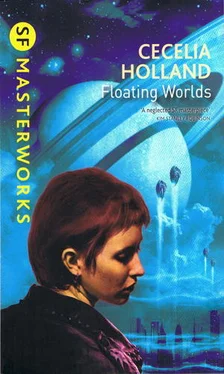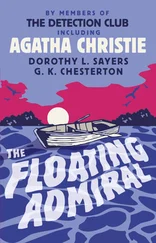“Again?” An Chu put her head back to look up.
“Come on,” Paula said. “This will make it easier—they’ll all be indoors.”
They went on side by side toward the west wall of the dome. The sirens’ hound-voices rose and fell, reached their high note, and stayed there. The first crash boomed in the peak of the dome. The thunder radiated out like a wave. Paula found herself walking at top speed in spite of her bad hip.
Another, louder bang sounded. Suddenly, just ahead of her and a hundred feet off the ground, there was a silent explosion of light, blue-white, brilliant as a sun. It was gone at once. She stopped, her breath caught in her lungs, An Chu beside her. They were near the top of a hill; to the north was another complex of buildings. The booming in the dome grew louder and the reports closer together. Another star burst at ground level between the two women and the buildings. For an instant the buildings, the land, the dead stumps of the trees were printed on Paula’s eyes like a photographic negative. The blackness that fell afterward was like being blind. Another boom echoed through the dome and a few seconds later another light shone, and one of the buildings to the north exploded into a stalk of flames.
Paula turned and ran down the hillside. Her ears rang. The thunder rolls of the attack came so fast they blended into one long crash. The light-bombs burst with every stride she took. An Chu ran beside her. The grass broke under Paula’s feet and a sharp dry stalk jabbed her in the leg. Dazzled by the bombs, her head throbbing from the racket, she ran straight into a heavy wire-mesh fence.
The attack ended. The sirens of the all-clear began to moan. Paula and An Chu climbed the fence and dropped down onto the smooth clipped grass of a Martian lawn. Limping, Paula jogged toward the dome wall, just ahead of them beyond a building. Voices sounded, and people began to spill out of the below-ground floors onto the grass. The lights in the building came on. Paula and An Chu went unnoticed in the crowd; they sneaked down into a basement to hide for the day.
An Chu found them a banquet in the garbage: soggy bread and apple cores and four containers with beans and vegetables still clinging to the bottoms. They drank from a public fountain and spent most of the day in the basement of the building, in behind the cleaning machines. After dark they started along the wall of the dome, going north, to find the entry port, the most secure place in the dome.
It bulged out of the side of the dome, taller than any building, about fifteen minutes’ walk from where they had spent the day. The wire fence surrounding it was strung on rubberized posts. Five feet inside this fence was another fence, higher, also insulated.
Paula sat down. Her backside hurt more than yesterday and she knew it was infected. “That must be where those prisoners are.”
“Is it electric?” An Chu put her hand out.
“Touch it and find out.”
“Why are you in a mood?”
Paula looked away. Now that they had found Jennie, there was nothing to do to help her. She got up and went on along the fence, limping. The blank wall of the entry port rose up beyond the second fence. She could see people walking on the ramp over her head, perhaps sentries. One leaned on the rail a moment and she saw the barrel of a gun on his shoulder.
“When the Styths raid again,” An Chu said, “we can try to get in.”
Paula rammed her hands into her pockets. Every time her left foot hit the ground her whole left side ached. She had to remember that and compensate for it. The fence curved away from them and she bent her course to follow.
“Hey! Stop where you are!”
The shout struck her like a bullet. She sprinted dead away from the fence, toward the darkness. The lawn spread out before her. An Chu passed her ten feet to one side, her arms pumping.
“Stop or I’ll shoot!”
Paula’s hip threatened to give way. She could not run. She dropped down flat on her face on the ground. An Chu kept running. A gun fired a burst of shots. An Chu fell to her knees. Other people were hurrying after them across the grass. An Chu struggled onto her feet. The gun rattled again and the woman fell and lay still.
A man with a gun ran by Paula, and she got up. People crowded toward An Chu where she lay on the grass. Paula went in among them. The anarchist was dead; the spray of bullets had cut her like an ax. A tall man behind Paula said, “Weren’t there two of them?”
Her hands in her pockets, she walked away from the clot of people. Behind her voices rose, and the gun went off again in a sudden burst. There was no place to hide. She kept herself from running, which would surely give her away, and tried not to limp. The gun rattled again, far back there. Shooting at Martians. Something huge and vague loomed up ahead of her. She put her hands out and touched cold net.
The fence. She leaned on it, her face against it, damp on her cheek. She had no strength left to climb it. Her fingers crooked into the mesh. Up. Her left leg refused to move. She flung one arm up over her head and took hold of the fence. Up. The air sang with the shrill yell of a siren. Like krines only louder. She dragged herself up the fence, her toes jammed into the meshwork. Throwing her arms over the top, she hung there, out of strength. The sirens screeched behind her. Her left leg dangled uselessly. She squirmed up and across the top of the fence. The barrage began. The lights seemed to burst inside her head, exploding in her eyes. Blinded and deafened, she struggled her body over the fence and let go and fell. It did not hurt when she fell. The ground quaked under her. She gained her feet and shuffled away into the wasteland.
She came back to the Nikoles Building in the daylight and stayed out in the park until night rolled over the dome. Her face was hot and her mouth parched and she could barely walk on her bad leg. After sunset she crept into the tunnel and slid down to the hatch into the secret room.
Willie answered her knock. “Paula!” He helped her out of the hatch. “Where have you been? Where’s Ana?”
“She’s dead.” Paula lay on the cot. Her lips were cracked with thirst and fever.
“Dead,” Willie said.
She rolled her arms around her head. Her whole body hurt. He gripped her forearms and shook her. “What happened?”
“Let me alone.”
He shook her harder, back and forth, until she moaned. “What happened? Where did you go?” She was getting sick to her stomach. Her head was spinning off her neck. She slumped into a thick dark exhaustion.
When she came back to waking, she was lying on the floor, thickly wrapped in blankets. The only light in the room was the greasy dip-lamp burning in a chink in the dirt wall. She moved, untangling herself from the blanket, and knocked over a cup of water beside her. There was a patch of tape stuck to the inside of her elbow.
“Dick?” she said.
At the end of the room, something stirred in the dark. Bunker came down toward her, past the cot where Willie was asleep. “What happened?” He picked up the overturned cup.
“Jennie’s in the entry port. You were right. There’s nothing we can do.”
“Then why did you try?”
“The debt owed to common humanity.”
“You keep saying that. What does it mean?”
“Ask Saba. It’s one of his dicta.”
“Then it’s meaningless. Give me your arm.”
She held her arm out toward him, and he ripped the tape patch away. On the pale field of skin at the crease of her elbow were several small pinpricks of blood. He took another patch out of its paper folder and stuck it to her arm.
“No,” she said. “It means something to him. To An Chu, maybe even to me. We couldn’t let Jennie go without trying.”
Читать дальше











